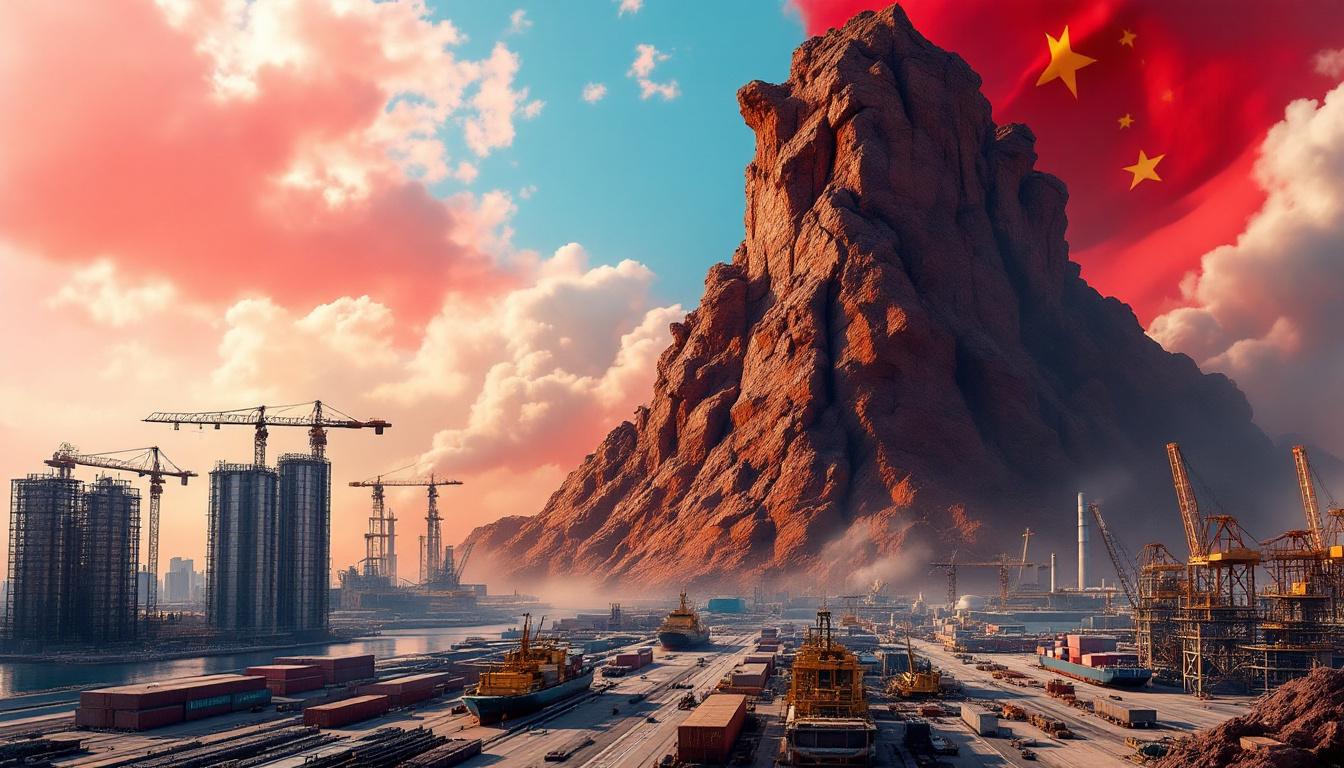What is the Orano Lawsuit in Niger About?
The legal battle between French uranium mining giant Orano and Niger's military government has intensified dramatically, with Orano filing a formal lawsuit in Niger's courts on July 9, 2024. The lawsuit represents a significant escalation in what has become one of the most closely watched resource disputes in West Africa.
The Core Legal Complaint
Orano's legal action centers on multiple serious allegations against Niger's authorities, including "arbitrary arrest, illegal detention and unjust confiscation of property" related to both company personnel and assets. The French mining company, which has operated in Niger for over five decades, claims its staff have been subjected to improper treatment and intimidation tactics as part of a broader campaign to nationalize uranium resources.
"Our legal team has documented multiple violations of both Niger's civil code and international investment treaties," an Orano spokesperson stated in their official filing. "These actions violate fundamental protections guaranteed under Niger's own legal framework."
The lawsuit follows months of deteriorating relations between Orano and Niger's military junta, which seized power in a July 2023 coup. Industry analysts note that the legal action represents a last-resort effort after diplomatic channels failed to resolve the dispute.
Key Personnel Affected
At the center of the controversy is Ibrahim Courmo, Orano's mining director in Niger, who was reportedly detained and taken to the headquarters of Niger's external intelligence agency (General Directorate of External Documentation and Surveillance). According to company sources, Courmo was held for questioning for over 48 hours without formal charges or legal representation.
The managing directors of Orano's four subsidiaries in Niger—Somair, Cominak, Imouraren SA, and Orano Mining—were similarly detained and interrogated in their offices during coordinated raids. These operations, conducted by Niger's security services, resulted in the confiscation of company equipment and documents.
"During these raids, security personnel seized laptops, servers, and mobile devices containing proprietary geological data and operational information," noted mining analyst Jean Makala in a recent industry report. "The seizure of this technical data represents not just a legal issue but potentially compromises valuable intellectual property."
Company employees reported having their personal cellphones and electronic devices seized without warrants, with many still not returned weeks after the initial raids.
How Did the Conflict Between Orano and Niger Escalate?
The current legal battle represents the culmination of a rapidly deteriorating relationship that has unfolded over the past seven months, with each development pushing the parties further toward confrontation.
Timeline of Recent Events
December 2023: In a dramatic first move, Niger's military government seized operational control of the Somair mine, the country's largest uranium facility. The mine, which was 63% owned by Orano and 37% by Niger's state mining company, had been producing approximately 1,500 tonnes of uranium annually. Military personnel physically occupied the site and restricted access to Orano management.
June 2024: The situation deteriorated further when Niger unilaterally stripped Orano of its mining permit for the Imouraren subsidiary. This project, with estimated reserves of 200,000 tonnes, was poised to become one of Africa's largest uranium operations. The permit revocation occurred without the legally required consultation period mandated in Niger's mining code.
July 2024: The military government's actions expanded beyond just Orano, affecting Canadian mining firm GoviEx Uranium, whose permits were similarly revoked. This pattern demonstrated a systematic approach to reclaiming control of the country's uranium resources.
Early July 2024: Niger security services conducted coordinated raids on all Orano subsidiary offices in Niamey, the capital. These operations involved dozens of armed personnel and occurred without prior judicial authorization.
Present: Police forces continue to block access to Orano's subsidiary offices in Niger's capital, preventing staff from retrieving documents, equipment, or personal belongings.
Property Seizures and Access Restrictions
The government's actions have gone beyond mere regulatory measures, extending to physical control of assets and restrictions on personnel. Security forces have confiscated extensive electronic equipment, including:
- Servers containing geological survey data and operational records
- Computers with proprietary mining methodologies
- Mobile devices with communications between executives
- Storage devices containing financial and administrative records
"The nature and scope of these seizures suggest this isn't simply about contract renegotiation," noted resource security analyst Marie Dubois. "The comprehensive takeover of physical assets indicates a predetermined strategy to nationalize uranium production infrastructure."
Orano has been unable to establish contact with key personnel, including mining director Ibrahim Courmo, for extended periods during his detention. Company representatives report that security forces continue to maintain a physical presence at all subsidiary offices, preventing normal operations or document retrieval.
Why Are Resource Nationalism Tensions Rising Across the Sahel?
The conflict between Orano and Niger reflects a broader regional trend sweeping across the Sahel region, where military governments have increasingly asserted control over natural resources previously operated by Western companies.
Regional Pattern of Foreign Mining Pressure
The actions against Orano are not isolated incidents but part of a coordinated regional approach toward resource sovereignty. Over the past 18 months, military governments in Niger, Mali, and Burkina Faso have all intensified pressure on foreign mining operations in remarkably similar ways.
These three neighboring Sahel nations—all currently led by military juntas following recent coups—have employed nearly identical tactics:
- Unilateral revision of mining contracts without negotiation
- Seizure of physical assets at production sites
- Detention of foreign executives and technical personnel
- Revocation of long-standing permits despite contractual protections
- Nationalization of mining operations under "strategic resource" justifications
"What we're witnessing is an unprecedented level of coordination among these military regimes," explains Dr. Samuel Nkrumah, political economist at the African Resource Governance Institute. "The similar timing and approach suggests a shared playbook, possibly influenced by external actors seeking to reshape resource control in the region."
The military governments have effectively leveraged growing anti-Western sentiment, portraying resource nationalization as a patriotic reclaiming of sovereign wealth.
Similar Actions in Neighboring Countries
Mali's military government has been particularly aggressive, arresting foreign mining executives and seizing gold stocks during renegotiations with Western mining companies. In one notable case, Malian authorities confiscated over $200 million in gold reserves from a Canadian mining operation while simultaneously detaining two senior executives.
In Burkina Faso, the military government recently pledged to take control of more foreign-owned industrial mines, announcing plans to nationalize three major gold operations by 2025. The country's Minister of Mines stated publicly that "foreign companies have extracted our wealth for decades with minimal returns to our people."
This coordinated regional approach suggests a strategic realignment rather than isolated disputes. Resource nationalism has become a cornerstone policy for all three military governments, who face similar challenges in establishing legitimacy and securing revenue streams outside of traditional Western partnerships.
What Are the Broader Implications for Mining in West Africa?
The ongoing dispute between Orano and Niger's government signals profound changes for the mining sector across West Africa, with potential consequences extending far beyond uranium production.
Investment Climate Concerns
The legal battle highlights growing risks for foreign mining investments throughout the Sahel region. The Fraser Institute's 2024 Policy Perception Index now ranks Niger 65th out of 86 jurisdictions worldwide for mining investment attractiveness, a dramatic fall from its position just three years ago.
Industry analysts note several concerning implications:
- Capital flight risk: New exploration projects worth an estimated $1.2 billion are currently on hold across the Sahel.
- Insurance premiums: Political risk insurance costs have increased by 35-40% for mining operations in the region.
- Operational constraints: Companies are implementing 60-90 day contingency plans for potential nationalization.
- Investor wariness: Junior mining companies report increased difficulty raising capital for Sahel-based projects.
"The ripple effects extend beyond the mining sector itself," notes economic analyst Jean-Pierre Kouassi. "Supporting industries, from logistics to equipment suppliers, are already experiencing contraction as companies adopt wait-and-see approaches."
Resource companies may need to fundamentally reassess their operational strategies in politically volatile regions, potentially leading to:
- Shorter investment timeframes with accelerated capital recovery models
- Higher required returns to offset increased political risk
- Greater emphasis on local ownership and governance structures
- Diversification of asset portfolios to reduce exposure to any single jurisdiction
Geopolitical Context
These resource disputes unfold against a backdrop of significant political realignment. Niger's military government, which came to power through a coup in July 2023, has deliberately pivoted away from Western partnerships toward new relationships with Russia, China, and regional powers.
The actions against Orano reflect several key geopolitical factors:
- Declining Western influence: Traditional powers like France and the US have lost significant leverage following military base closures and diplomatic tensions.
- New strategic partnerships: Niger has signed preliminary agreements with Russian mining interests to replace Western operations.
- Popular sovereignty narratives: Military governments have effectively mobilized public support through resource nationalism rhetoric.
- Regional coalition building: The coordination among Niger, Mali, and Burkina Faso represents an emerging bloc with shared anti-Western positioning.
"Resource control has emerged as the most visible and economically significant expression of sovereignty for these new military governments," explains regional security analyst Ibrahim Touré. "By asserting control over uranium mining halt in Namibia, gold, and other strategic minerals, they simultaneously secure revenue streams while demonstrating independence from former colonial powers."
This shift comes as global demand for critical minerals—particularly uranium for nuclear energy—continues to rise amid energy transition pressures. Niger's uranium, which previously supplied approximately 12% of EU requirements (primarily for France's nuclear program), now appears poised to enter new markets with different partners.
FAQ: Understanding the Niger-Orano Mining Dispute
What is Orano's historical presence in Niger?
Orano (formerly Areva) has operated uranium mines in Niger since 1971, establishing one of the longest-running foreign mining presences in the country. The company's Somair mine, established in partnership with Niger's government, has been the cornerstone of a relationship that helped make Niger the fifth-largest uranium producer.
For over five decades, Orano's operations have:
- Produced more than 140,000 tonnes of uranium
- Employed approximately 2,500 local workers at peak operations
- Contributed an estimated $3.8 billion to Niger's economy
- Developed specialized mining techniques for Niger's uranium deposits
How significant is Niger's uranium production globally?
Niger ranks as the world's fifth-largest uranium producer, outputting 2,991 tonnes in 2023, representing approximately 5% of global production. The country's uranium reserves are estimated at 275,000 tonnes, placing it among the world's top seven holders of proven uranium resources.
This production is particularly critical for:
- European energy markets, where Niger has traditionally supplied 12% of EU uranium requirements
- France's nuclear energy program, which relies heavily on historical supply relationships
- Global energy transition efforts that anticipate increased nuclear generation
- Western supply chains seeking alternatives to Russian and Kazakh uranium
What legal recourse does Orano have beyond Niger's courts?
While Orano has initiated action in Niger's domestic courts, the company has several potential international legal avenues available:
- International Centre for Settlement of Investment Disputes (ICSID): Niger is a signatory to the ICSID Convention, providing a potential arbitration forum.
- Bilateral Investment Treaty: The France-Niger BIT contains investor protection clauses and dispute resolution mechanisms.
- ECOWAS Court of Justice: Regional frameworks may provide additional venues for challenging government actions.
- Diplomatic intervention: While not strictly legal, French government intervention remains a possibility given uranium's strategic importance.
The effectiveness of these mechanisms depends heavily on Niger's willingness to recognize international rulings, which remains uncertain given the military government's stance on sovereignty.
How might this dispute affect uranium markets?
The Orano-Niger dispute introduces significant uranium market volatility that was already experiencing supply constraints. Industry analysts identify several potential impacts:
- Short-term supply disruptions: Niger's production represents approximately 5% of global supply, creating immediate tightness.
- Price volatility: Uranium spot prices have increased 8% since the dispute escalation in early July.
- Contract renegotiations: European utilities are reportedly seeking alternative supply sources with more stable jurisdictions.
- Investment redirection: Exploration capital is shifting toward uranium projects in Canada, Australia, and Kazakhstan.
"The most significant long-term impact may be a fundamental reassessment of geopolitical risk in uranium supply chains," notes commodities analyst Sophie Rodriguez. "As nuclear power gains importance in energy transition strategies, security of uranium supply has become a matter of national security for many countries."
Mining Industry Transformation in the Sahel
The Orano-Niger dispute represents more than an isolated legal battle—it signals a transformative shift in how mining operations must approach the Sahel region. This transformation extends beyond uranium to affect gold, lithium, copper, and other critical minerals increasingly essential to global supply chains.
New Operational Models Emerging
Foreign mining companies are rapidly adapting to the changing landscape with innovative approaches:
- Enhanced local partnerships: Increasing local ownership stakes from traditional 10-20% to 30-45%
- Front-loaded infrastructure development: Building community assets earlier in project timelines
- Transparent revenue sharing: Implementing blockchain-based tracking of mineral sales and tax payments
- Technology transfer commitments: Establishing local technical training centers and R&D facilities
"The companies most likely to succeed in this new environment will embrace genuine partnership models rather than traditional extraction approaches," explains mining governance specialist Aminata Diallo. "This means reimagining both operational structures and benefit-sharing frameworks."
Strategic Mineral Security Concerns
The situation in Niger highlights growing concerns about critical mineral supply chains, particularly as energy transition technologies increase demand for uranium, lithium, cobalt, and rare earth elements.
The US uranium tariff threats and recent US mineral production order reflect growing concerns about supply security, while the European Union's critical minerals strategy specifically cites supply diversification as a strategic priority. The disruption in Niger underscores the vulnerability of concentrated supply chains and may accelerate efforts to:
- Develop alternative uranium sources in politically stable jurisdictions
- Extend the operational life of existing nuclear facilities
- Advance recycling technologies for nuclear fuels
- Establish strategic reserves of critical minerals
As resource nationalism gains momentum across the Sahel and beyond, mining companies, investors, and energy planners must navigate a dramatically changed landscape—one where geological potential must be weighed against unprecedented levels of political risk and operational uncertainty.
Want to Stay Ahead of the Next Major Mining Discovery?
Don't miss potential investment opportunities from significant mineral discoveries on the ASX. Visit Discovery Alert's discoveries page to learn how their proprietary Discovery IQ model helps traders and investors capitalise on major announcements before the broader market reacts.




